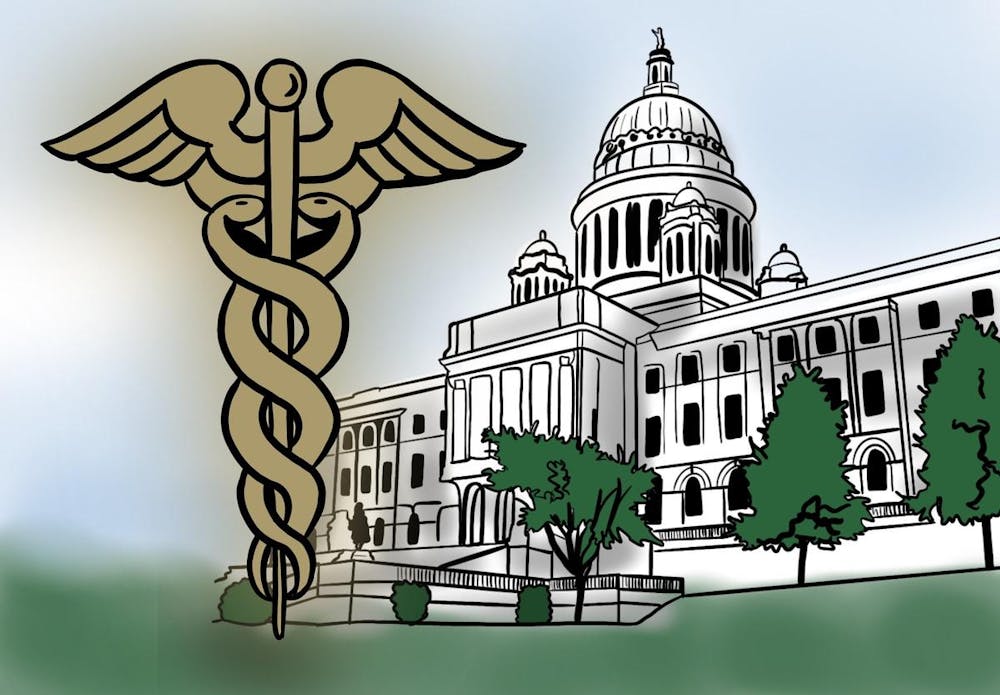On March 5, leaders of the Rhode Island Senate unveiled the Rhode Island Holistic Enhancement and Access Legislation for Total Health Initiative, a 25-bill legislation package seeking to improve “health care access and affordability in Rhode Island,” according to a Rhode Island General Assembly press release.
The legislation package was announced by State Senate President Dominick Ruggerio (D-North Providence, Providence) and State Senate Majority Leader Ryan Pearson (D-Cumberland, Lincoln), alongside several members of the Rhode Island Senate Committee on Health and Human Services.
Chaired by Senator Joshua Miller (D-Cranston, Providence), the committee includes committee secretary Senator Pamela Lauria (D-Barrington, Bristol, East Providence) — a full-time nurse practitioner — and committee member Senator Alana DiMario (D-North Kingstown, Narragansett, New Shoreham), who also works as a mental health counselor.
At a press conference announcing the bill package, Ruggerio stated that “few issues are as important as healthcare, and right now, our healthcare system is in critical condition.”
“Healthcare absolutely must be accessible and affordable for all Rhode Islanders,” Ruggerio added. “For too many people in our state, care is too expensive or too difficult to get.”
In a 2022 Rhode Island Department of Health survey, 7.8% of polled Rhode Islanders responded that they “needed to see a doctor but could not because of cost” within the last 12 months. Additionally, 4.9% of survey respondents said they were uninsured.
Pearson stated in the press release that the HEALTH Initiative intends to address “the many intertwined factors that impact the healthcare system.” The bills “will have a real impact (on) improving the health of our health care system, containing costs for providers and consumers, and improving access to care,” he added.
The HEALTH Initiative addresses these “intertwined factors” by organizing the 25 bills into four pillars: consumer protection, provider availability and care quality, cost containment and health system financial stability.
Lauria said, in an interview with The Herald, that the difference pillars helped limit the package’s scope to most urgent needs. “There are other needs inside healthcare, but these just felt like good places that we could tackle and actually get stuff done,” she said.
In the category of consumer protection, proposed Senate Bill 2714 would require all hospitals to screen uninsured patients for Medicare and Medicaid eligibility, while Senate Bill 2712 would expand state-level medical debt forgiveness programs. Additionally, Senate Bill 2710 seeks to establish a new cap on medical debt interest rates to increase access to healthcare services.
To support the pillar of provider availability and care quality, Senate Bill 2717 establishes the Medical Primary Care Scholarship Program, which funds a 4-year scholarship for those studying to become primary care physicians, nurse practitioners or physician assistants.
This category also features a variety of interstate compacts for health professions, which streamline healthcare worker licensing processes and enable licensed professionals to practice in other compact member-states.
To address cost containment, Senate Bill 2719, for example, proposes the creation of a drug affordability commission tasked with evaluating new medications prior to distribution in the state. The proposed commission examines these medications based on affordability and sets a lower, statewide price for the medication if the costs are deemed unaffordable.
Finally, in the pillar of health system financial stability, Senate Bill 2725 expressly prohibits pharmaceutical manufacturers from discriminating against entities of the 340B Drug Pricing Program, where medical facilities that treat low-income patients are eligible for discounted prescription medication.
According to Lauria, the initial idea for a healthcare-related bill package arose in September 2023, after she and DiMario attended the Health Costs Seminar hosted by the National Conference of State Legislatures. “We came away from that with ideas on some good legislation to help with some medical debt protections and consumer protections,” she said.
As the legislative session started in January, they presented their ideas to Pearson as a package of five bills. But the conversation soon expanded to other bills senators planned to propose.
We “realized that some of these (pieces of) legislation came into focus as something of a larger package,” Lauria said. “So then, (we) just brought together what a lot of different senators were working on and that’s where the 25 bills came from.”
Lauria also highlighted how statewide stakeholders contributed to the HEALTH Initiative through the Task Force for Primary Care Workforce Development as part of Care Transformation Collaborative Rhode Island. Additional collaborators include the Rhode Island Office of the Health Insurance Commissioner and South County Hospital.
Early last year, CTC-R.I. convened the task force and brought together representatives of primary care training programs at Brown, the University of Rhode Island, Salve Regina University and Johnson and Wales University. The task force also includes pediatric care specialists and representatives of Hasbro Children’s Hospital.
According to Lauria, two of the bills introduced in the package — Senate Bill 2717 and Senate Bill 2716 — came from the task force’s deliberations in the summer of 2023.
The various bills included in the HEALTH initiative are set to be heard in committee. Lauria noted that the bills were filed in a variety of Rhode Island Senate committees, including the Senate Committee on Health and Human Services, the Senate Committee on Commerce and the Senate Committee on Finance.
“Healthcare is an extremely complex policy area — the details can be daunting, and consensus can be difficult to reach,” Miller said at the press conference. “I am grateful to Senate leadership, the members of the Health and Human Services Committee, the staff members and stakeholders who support and inform our work and my colleagues for their efforts to advance this initiative.”

Tom Li is a Metro editor covering the health and environment and development and infrastructure beats. He is from Pleasanton, California, and is concentrating in Economics and International and Public Affairs. He is an avid RIPTA passenger and enjoys taking (and criticizing) personality tests in his free time.





